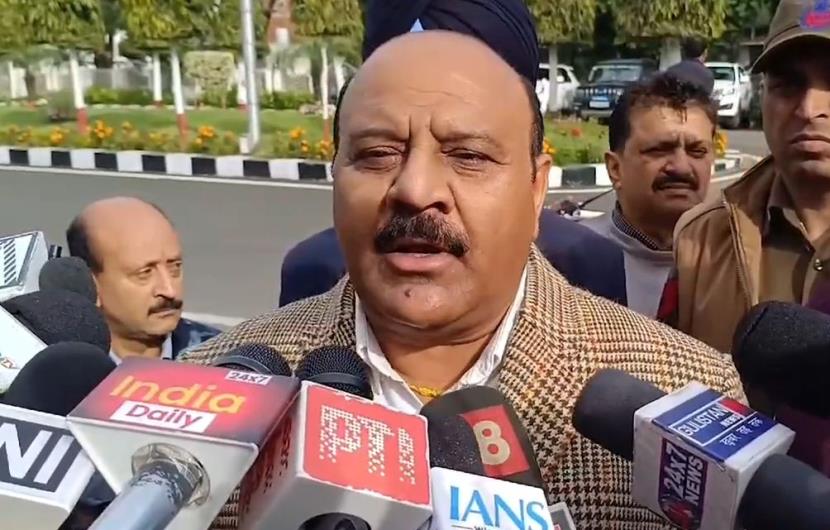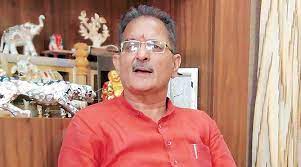Kashmir Political Showdown: Omar Abdullah Defies State Control as BJP, NC Trade Blows Over Martyrs’ Day and Governance
By: Javid Amin | Srinagar | 15 July 2025
As the BJP escalated its attacks on Omar Abdullah over the Martyrs’ Day controversy, the Jammu & Kashmir government didn’t stay silent for long. In a forceful rebuttal delivered from Jammu, Deputy Chief Minister Surinder Choudhary struck back with a sharp rejoinder:
“The BJP can’t digest our progress.”
His comment wasn’t just rhetorical flair. It was a full-throated defense of the Omar Abdullah-led National Conference government, which Choudhary claimed had delivered more in eight months than the BJP did in years of indirect rule through the Lieutenant Governor’s administration.
Speaking at a party joining event, Choudhary’s tone was unapologetically confident—and his message was clear: the people’s mandate is working, and BJP’s outrage is rooted in political envy.
Ground Realities vs Grandstanding: What the Government Has Delivered So Far
Choudhary’s speech sought to pull the narrative back from historical disputes and political symbolism to the realm of governance and delivery.
He highlighted key achievements that reflect a focused, reform-driven governance model:
01. Mission Yuva: A Game-Changer for Kashmir’s Youth
One of the flagship programs launched by the Omar government, Mission Yuva, aims to:
-
Create 1.5 lakh startups across urban and rural Kashmir.
-
Generate 4.5 lakh jobs in high-demand sectors like renewable energy, tech services, and agribusiness.
-
Provide seed capital, skill training, and digital literacy support to young entrepreneurs.
“While the BJP sold dreams, we’re helping youth become job creators,” Choudhary said.
This initiative comes at a time when youth alienation and unemployment in Kashmir are among the highest in the country. Mission Yuva is pitched as a direct answer to those structural challenges, grounded in inclusion, innovation, and impact.
02. Crackdown on Corruption: A Clean-Up of Past Sins
The Deputy CM didn’t mince words about the alleged rot left behind:
-
He cited a multi-level probe into recruitment scams, especially under the previous administration.
-
Several mid-level officers have been suspended or arrested for favoritism, fraud, and document tampering.
-
“We are making sure merit matters again,” he said, referring to reforms in JKSSB and police recruitment.
This anti-corruption push plays well with the public, especially in Kashmir where corruption has long been seen as systemic and unaccountable.
03. Jal Jeevan Mission Probe: Transparency over Tokenism
In a bold move, the NC-led government has set up a Legislative Committee to probe whistleblower allegations of large-scale embezzlement under the Jal Jeevan Mission, a central scheme meant to provide tap water to every home.
This is significant because:
-
The scheme was previously touted as a BJP success story.
-
Allegations now point to fund diversion, ghost contractors, and inflated billing—primarily during the LG-led interim rule.
“We will not let any sacred cow escape scrutiny,” Choudhary warned.
Political Subtext: A War of Models—Performance vs Propaganda
Surinder Choudhary’s comments also carried clear political subtext. According to him, the BJP’s reaction to Omar’s symbolic gesture was less about law and order and more about panic over rising popularity and administrative efficiency.
“We’re changing things on the ground. That scares them more than any graveyard speech.”
He accused BJP leaders of:
-
Deflecting from their own failures by focusing on emotional flashpoints.
-
Attempting to discredit reformers rather than correcting systemic issues.
-
Launching smear campaigns instead of letting democratic institutions function.
This framing allows the NC government to reposition itself as both victim and victor: a team working hard, being obstructed, yet still delivering.
Message to Cadres: Spread the Word, Guard the Gains
In his address, Choudhary didn’t just attack the BJP—he also called on NC’s grassroots workers to:
-
Educate the public about what the government has achieved in just eight months.
-
Dispel the BJP’s narrative about “lawlessness” and “rioters”.
-
Stay vigilant against administrative sabotage or narrative manipulation.
He also reminded party workers that visibility and credibility must go hand in hand.
“Don’t let noise drown out performance. Let every panchayat, every ward, know that change has begun.”
This was a critical move. In Kashmir, where political memory is long and suspicion is deep, public trust has to be earned repeatedly and defended rigorously.
Where the Political Battle Now Stands
With this development, we can now clearly see the two models of politics competing in Kashmir:
| National Conference | BJP (UT administration & opposition) |
|---|---|
| Symbolism + Delivery | Stability + Central Control |
| Elected Mandate | Appointed Oversight |
| Historic Memory | National Integration |
| Civil Disobedience | Rule of Law Framing |
| Youth Empowerment | Infrastructure Claims |
| Internal Investigations | Narrative Discipline |
This is not just a policy battle, but a clash of governance philosophies—with far-reaching consequences for how democracy will function in post-370 Kashmir.
The Final Takeaway: More Than a Showdown—It’s a Governance Stress Test
When viewed holistically, the current crisis is not just about Omar Abdullah climbing a wall or BJP crying foul. It’s a stress test of the new political order in Jammu & Kashmir.
-
Can elected leaders truly govern under Delhi’s oversight-heavy model?
-
Can historic memory and future vision co-exist, or will one be erased for the other?
-
Will the public respond more to performance or propaganda, jobs or jibes, accountability or accusations?
Deputy CM Choudhary’s confident defense suggests that the Omar-led government is ready to lean into the challenge—using both narrative control and ground delivery to hold political ground.
Whether it succeeds will depend on one thing only: how well it convinces the people of Jammu & Kashmir that it represents their aspirations, not just its own survival.



